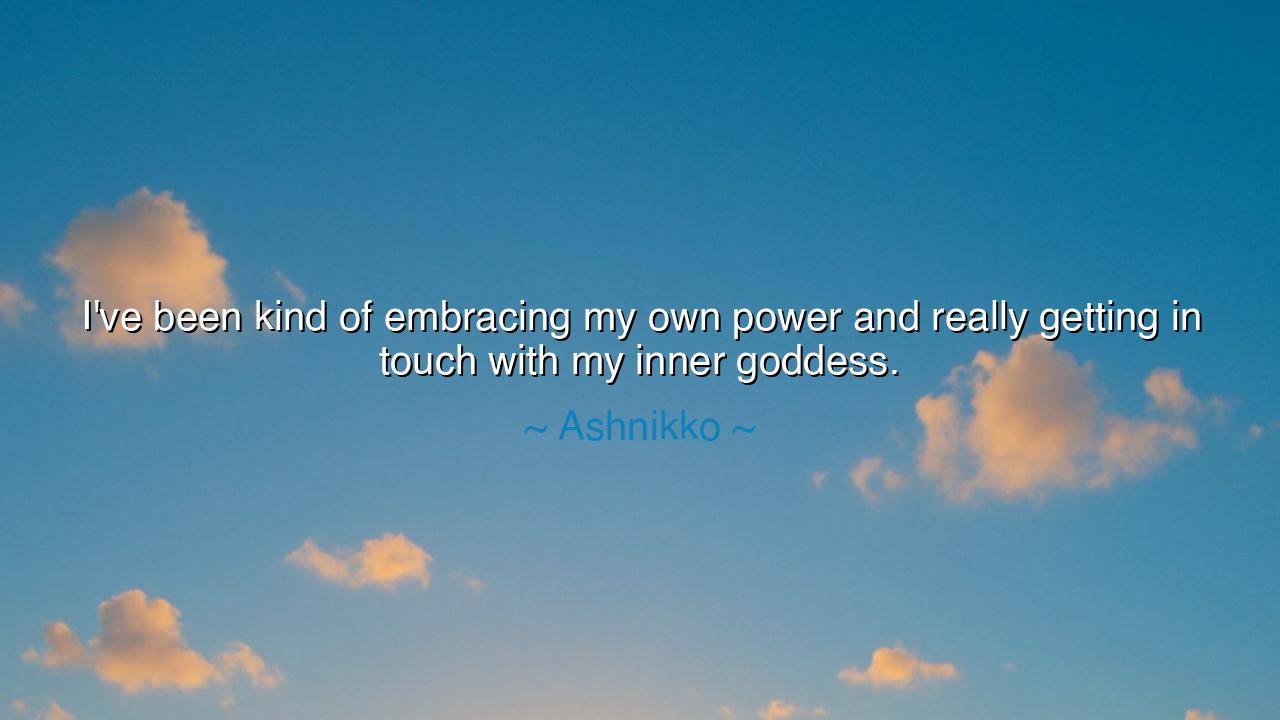
I've been kind of embracing my own power and really getting in
I've been kind of embracing my own power and really getting in touch with my inner goddess.






In the words of Ashnikko—“I’ve been kind of embracing my own power and really getting in touch with my inner goddess.”—there resounds a hymn to self-realization. She speaks of the awakening of power, not granted by others, but discovered within. To find the inner goddess is to recognize that divinity itself dwells in the human soul, waiting to be unveiled when courage and self-love drive away doubt.
The ancients knew this truth well. The Greeks told of Aphrodite, goddess of love and beauty, who rose from the sea not because others crowned her, but because she was already divine in her essence. So too does Ashnikko proclaim that true strength does not wait for permission or validation. It is found when one dares to step into their own light, acknowledging that they carry within themselves the sacred fire of the gods.
Her words also carry a defiance against the forces that diminish. Too often the world whispers that one is small, powerless, unworthy. Yet to claim one’s inner goddess is to shatter those chains, to rise as Inanna did in Mesopotamian myth—descending into darkness, stripped of all adornment, only to return radiant and crowned, stronger for having endured. Ashnikko’s embrace of self is not vanity but reclamation, the gathering up of fragments into wholeness.
Consider too the story of Joan of Arc, a simple peasant who heard the voice of destiny within herself. Though dismissed by men of power, she embraced the divine flame inside and led armies to victory. She did not seek strength in outward crowns, but in the certainty that the sacred dwelt in her heart. In the same spirit, Ashnikko’s declaration reminds us that every soul holds such a spark, waiting to be claimed.
Thus, let this lesson endure: do not wait for the world to tell you that you are strong—embrace your own power and honor the goddess within. For to know your inner divinity is to walk with unshaken confidence, to face storms with serenity, and to live not as a shadow, but as a radiant flame. The ancients sang of gods in temples and myths, but the wisest knew: the greatest temple is within, and the god or goddess we seek has always dwelt there.






NLPham Hoang Ngan Linh
I love Ashnikko’s confidence in embracing her inner goddess. It makes me think about how often we forget to acknowledge our own strengths. Do you think embracing such a powerful concept could help people overcome insecurities or challenges they face in life? How does reconnecting with ourselves in this way help us feel more aligned with our purpose and more empowered to chase our dreams?
KAVu Hoang Khanh An
Ashnikko’s statement about embracing her inner goddess highlights a strong sense of self-realization and empowerment. It raises the question: how can we all cultivate our own sense of inner strength? Do you think society often underestimates the importance of self-discovery and embracing our full potential? What might happen if more people truly embraced their inner power, especially in a world that often encourages self-doubt?
LCLe Chi
The idea of embracing one’s ‘inner goddess’ is a beautiful concept. It reminds us of the power of self-acceptance and embracing our true selves. Does tapping into this power help us unlock more confidence and creativity in our lives? How can this mindset shift change the way we approach our goals and relationships? Could this idea challenge societal norms of beauty and power?
HLvu dang ha linh
Ashnikko’s idea of embracing her inner goddess speaks to the importance of self-empowerment. How often do we neglect our own strength in favor of external validation? What does it mean to truly ‘get in touch’ with that power? Is this just a personal journey, or can it also be a collective one that encourages others to embrace their own potential and self-worth?
HAKhúc Ngọc Hà Anh
Ashnikko’s quote about embracing her inner goddess is empowering. It makes me wonder, how does reconnecting with our own sense of power influence the way we navigate life? Do you think acknowledging and embracing personal strength can transform the way we approach challenges? How does this concept of an ‘inner goddess’ differ from traditional ideas of strength, and how can it shape our relationships with others and ourselves?